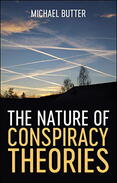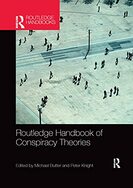 The topic of our meeting was conspiracy theories. We discussed the book The Nature of Conspiracy Theories by Michael Butter at Tubingen University in Germany, who also is the co-editor of a large compilation of essays entitled the Routledge Handbook of Conspiracy Theories. The author states: ”The popularity of these conspiracy theories shows that revelations concerning alleged plots by countries, intelligence services, international institutions or groups of powerful individuals are no longer confined to subcultures, but now are reaching a wider public.” In other words, conspiracy theories are held by such a large segment of the population — both here and in Europe — that they have become mainstream. Theories are, of course, efforts to explain reality in a way that makes it comprehensible. But those who promote conspiracy theories, according to the author, are less interested in truth than in finding people to blame for assumed large-scale plots that attempt to control the world. We began our discussion by asking our members to consider the question: “What is truth?” This produced a number of responses: “consensus,” “empirical science,” “facts” and “it is derived from multiple sources.” This demonstrated the challenge to even knowing what is true.  Group members stated that, in providing information about the world to the public, news sources at one time strived to be objective. But with the advent of cable television — and then the internet — those who wish to push a partisan view easily can find audiences that are willing to believe what they are told, and often rely on an information source that reflects the views that they already hold. For example, if viewers are aligned with one political party or viewpoint, it is easy to get them to listen only to “news” that vilifies the other side. This prevents users from getting a more balanced view, or aligning their ideas with a more objective “truth.” The extreme example of that is what happens when people become convinced that there is a deliberate plot to conspire against their best interests. This can be the result of feeling hopeless and that there are no solutions, especially in government, to their dilemma. It leads to trying to determine who to blame for their situation, and since they believe the government has failed them, there must be intentional elements, or even a conspiracy among agencies, against them. This can become paranoia on a mass scale, but paranoia becomes a conspiracy theory, and an alternative reality, when held by enough people. Of course, there are valid views held by some that there are people aligned against them. That was the case with Blacks in the US from the end of the Civil War, and according to some, is continuing into our own day, which many believe holds Blacks back educationally, financially, and in employment advancement. But this theory — whether currently true or not — can be debated among people with the aid of facts and statistics, as can possible solutions to the problem. The difference between this hypothesis and conspiracy theories is that those who hold them have already made up their minds that there is no solution to the issues they discuss, which causes conspiracy theories to be long-lived until they are replaced by others. A false premise behind conspiracy theories is that they “are based on the assumption that human beings can direct the course of history.” This would need to involve a global network that is impossible to construct. They are not theories in the scientific sense — subject to revisions — because “conspiracy theorists almost always know who the culprits are before they begin their investigation.” Those who hold these extreme inflexible beliefs begin to consider them part of their identity, so challenging them, in their minds, becomes a personal attack. The author states that social media outlets like Twitter exacerbate the problem: “What Twitter calls for are brief soundbites and unsubstantiated claims — in short rumors.” The real problem is that many people are willing to believe unsubstantiated claims because it provides simple answers, and then they see no reason to pursue a more balanced truth. “Many important issues are no longer debated by society as a whole. Instead, sub-publics have turned into echo chambers or even filter bubbles. Arguments from the outside no longer can penetrate or are no longer taken seriously. This is a serious problem for democratic societies.” The solution? “A highly desirable goal would be to teach more people social literacy at school and university. We all have to learn, and must go on learning, to discriminate between reliable and unreliable sources of information, and to recognize the difference between someone’s personal YouTube channel or blog and the website of a quality newspaper. We need to learn and, above all, teach young people how the Internet works and how it generates meaning. … After all, if societies can no longer agree on what is true, they will not be able to resolve the pressing problems of the 21st century. Your comments and thoughts always are welcome. Also, don’t forget to look at our blog site: renewingdemocracy.org Please recommend this newsletter to people who you think might appreciate it. If you want to be added to the list to receive each new newsletter when posted, fill out our contact form and check the box just above the SUBMIT button. You may also use that form to be removed from our list.
Visit our Books page for information about purchasing The Future of Democracy, The Death of Democracy, Truth and Democracy, and Guide to Living In a Democracy. Click ↓ (#) Comments below to view comments/questions or add yours. Click Reply below to respond to an existing comment.
0 Comments
Your comment will be posted after it is approved.
Leave a Reply. |
 5th edition now available 5th edition now available
Steve ZolnoSteve Zolno is the author of the book The Future of Democracy and several related titles. He graduated from Shimer College with a Bachelor’s Degree in Social Sciences and holds a Master’s in Educational Psychology from Sonoma State University. He is a Management and Educational Consultant in the San Francisco Bay Area and has been conducting seminars on democracy since 2006. Archives
July 2024
Categories |
 RSS Feed
RSS Feed